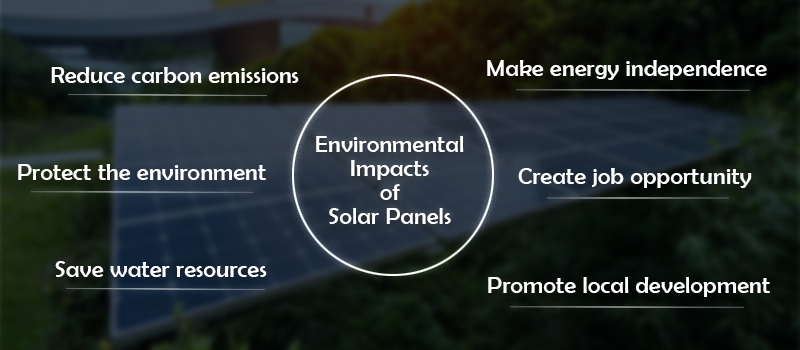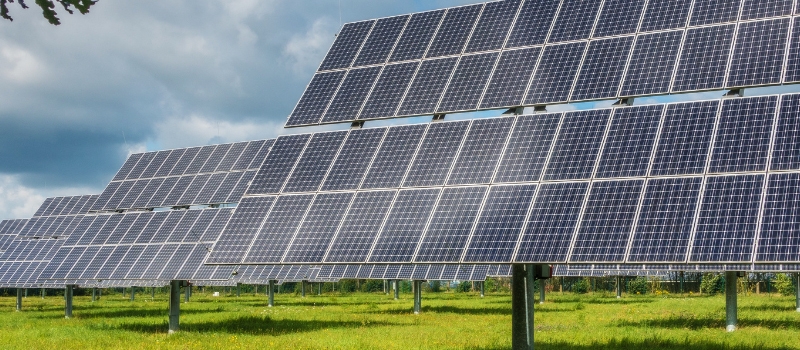Solar panels are a topic of great interest worldwide because they are a clean, renewable energy source. President Joe Biden's recent sharing of his climate change plan, which aims to increase the use of renewable energy and prioritize environmental protection, demonstrates the importance of new energy generation. This blog will explore the multifaceted impact of photovoltaic panels on the environment to demonstrate their important role in human civilization and natural ecology.
Natural Impacts of Solar Panels
As an infinite resource, solar energy can help mitigate our impact on the climate by minimizing our reliance on fossil fuels, reducing air pollution and promoting sustainable development. Learn more about these environmental benefits of solar power below:

Reduce Carbon Emissions
Non-renewable energy sources like oil and coal are damaging our environment by releasing large amounts of carbon dioxide into the Earth's atmosphere when converted into usable energy. According to recent studies, the Arctic Ocean could be completely frozen by 2050 due to carbon emissions. This would have long-term harmful effects on our land and water. PV panels are the solution. They increase the use of renewable energy and reduce the amount of CO2 released into the atmosphere due to the consumption of non-renewable energy sources.
- The International Energy Agency (IEA) has confirmed that photovoltaic power is responsible for reducing global carbon dioxide emissions by approximately 250 megatons each year.
- A typical home solar powered panel system (e.g., 5 kW) will reduce CO₂ emissions by about 3 to 4 tons per year.
Protect the Environment
Solar panels are a cleaner source of energy than fossil fuels. They don't produce air pollutants like sulfur dioxide (SO₂), nitrogen oxides (NOx), and particulate matter (PM). Coal-fired power generation is a major source of mercury emissions. Solar panels don't involve combustion, so they don't contribute to mercury emissions. These pollutants cause respiratory diseases, cardiovascular diseases, and environmental pollution. photovoltaic panels protect the environment and human health by improving air quality.
Solar panels do not require large-scale mining and transportation, reducing damage to the natural ecosystem. They can also be installed in locations that are designed to be biodiversity-friendly habitats. If you want a solar-powered green building, build a rooftop garden on your own roof or balcony. It'll be environmentally friendly and aesthetically pleasing.
Save Water Resources
Conventional thermal power plants, especially coal-fired and nuclear power plants, generate a lot of heat during the power generation process and require large amounts of water for cooling. Solar panels, on the other hand, do not require such a cooling system. Solar panels have a unique working principle in that they convert sunlight directly into electricity through the photovoltaic effect without generating a lot of heat.
- Solar panels are an invaluable resource in arid and water-scarce areas. It is estimated that they can save approximately 1,000 gallons of water for every megawatt hour of electricity generated.
Human Impact of Solar Panels

-
Make energy independence: Solar panels are the solution to our energy problems. They allow homes and businesses to become self-sufficient and reduce their dependence on traditional energy sources. This means that there is no longer a need to rely on external energy supplies, thus increasing energy security.
-
Create jobs: The manufacture, installation and maintenance of PV modules require manpower, thus creating a large number of employment opportunities. The development of the PV panel industry has also led to the development of related industrial chains, such as supporting solar power generators, battery manufacturing, material supply, installation services, etc., which has further boosted the prosperity of the job market.
-
Promote local development: Solar panels are a powerful tool that communities can use to meet their needs and improve their quality of life. They can also be used for community infrastructure construction, such as street lights and charging stations, to further improve the community environment.
The Future of Solar Panels
President Biden’s new climate change plan is designed to take significant steps toward sustainable living by 2030. Outside of that plan, there is a 26% federal tax credit5 available for homeowners who install solar panels through the end of 2022. The credit decreases in 2023, so you’ll want to take advantage of the credit while you can. Also, the cost to install solar panels has decreased by 70% in the last decade, so prices become more affordable every day.
Get involved in the renewable energy movement and start living a green, healthy off-grid lifestyle today. Go solar and reduce your carbon footprint while potentially saving money on your electric bill. At PowerHome, we are proud to offer expert solar consulting services. We welcome your questions and inquiries via email.
(1).png)
(1).png)